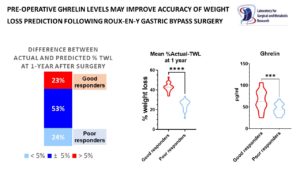
Pre-operative ghrelin levels may improve post-surgery weight loss prediction in patients undergoing bypass surgery, according to a new study presented during the SSAT Presidential Plenary session at Digestive Disease Week® (DDW) 2022.
“Current tools to predict post-surgical weight loss only consider features like patient demographics and comorbidities,” said Andrei Moscalu, MCh, MD, a post-doctoral research fellow at the Laboratory for Surgical and Metabolic Research at Brigham and Women’s Hospital, who presented the study. “Our research shows that current calculators are not perfect and demonstrate the value of including biological markers in weight loss predictions.”
The study consisted of a cohort of 95 patients who underwent Roux-en-Y gastric bypass surgery. Dr. Moscalu and colleagues predicted the patients’ post-surgery weight loss using the MBSAQIP Bariatric Surgical Risk/Benefit Calculator. This online calculator considers factors like body mass index (BMI), age, medical history and other demographic information to predict one-year post-surgical outcomes. They found that the predicted weight loss was incorrect by more than 5 percent in about half of the patients — 23.2% of patients lost more weight than predicted while 24.2% lost less weight than predicted.
“This calculator is an important tool for many surgeons,” said Dr. Moscalu. “It involves the patients and encourages shared decision-making. However, our results show that there is significant room for improvement.”
The researchers evaluated whether pre-surgical intestinal hormone levels were different between patients who, at one-year post-op, lost more weight than predicted (good responders) and those who lost less weight (poor responders). Of the six hormones measured, only ghrelin, an appetite hormone, was significantly higher in the good responders group, suggesting an important role for this hormone in driving post-operative outcomes and that failure to respond to bariatric surgery may be driven in part by biology rather than patient behavior.
- Demographics and baseline characteristics were similar between those who lost more weight and those who lost less weight than predicted.
- Pre-operative ghrelin levels were significantly higher in patients who lost more weight than predicted (good responders).
“Pre-operative markers that help patients better anticipate their post-surgery outcomes can improve shared decision-making and can influence surgical selection, follow-up strategies and the need for adjuvant weight loss therapy,” said Dr. Moscalu.
Dr. Moscalu stressed that the results are limited because they come from a small population, considered only a single bariatric surgery procedure and looked at a relatively short follow-up period. Larger, long-term studies are needed before including biomarkers like ghrelin levels in surgical decisions.
“Bariatric surgery is highly effective at promoting weight loss and improving obesity-related conditions; however, many patients are hesitant to go through such an invasive procedure because they are afraid they will gain the weight back,” said Ali Tavakkoli, MD, principal investigator of the study and chief of the Division of General and GI surgery at Brigham and Women’s Hospital. “Improving weight loss prediction can give patients additional peace of mind when choosing whether to undergo bariatric surgery.”
Dr. Moscalu will give the oral presentation, “Pre-operative ghrelin levels may improve accuracy of weight loss prediction following Roux-en-Y gastric bypass surgery” on Sunday, May 22, at 8:15 a.m. PDT as part of the SSAT Presidential Plenary session.




